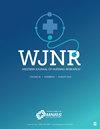Research Guided by the Theory of Care-Seeking Behavior: A Scoping Review
IF 2
4区 医学
Q2 NURSING
引用次数: 0
Abstract
Background:A particular Theory of Care-Seeking Behavior was developed to explain care-seeking behavior with psychosocial concepts, external conditions, and clinical and demographic factors. Having a careful review of studies based on this theory could guide future research on care-seeking behaviors.Objectives:With a scoping review: describe characteristics of studies guided by a Theory of Care-Seeking Behavior, summarize support for the relationships of proposed, explanatory variables with care-seeking behaviors, and examine support for propositions in the theory.Method:Searching 5 electronic databases, we sought studies that were: full-text, peer-reviewed, in English, data-based, guided by the theory, and published from January 1, 1992, to January 1, 2022.Results:Across 18 identified articles, the behaviors studied included: symptomatic screening (n = 8), asymptomatic screening (n = 7), and care-seeking behaviors for either screening or symptoms (n = 3). A total of 3328 adults participated in the studies. In 16 studies, all participants were female. In 60% to 83% of studies, researchers had reported findings that supported the relationships of explanatory concepts with care-seeking behavior. Among the 7 studies that tested the 2 propositions of theory, all 7 tests failed to support the proposition that clinical and demographic factors influence care-seeking behavior indirectly through psychosocial variables. Six tests supported the proposition that psychosocial variables influence behavior conditionally, on external conditions.Conclusions:Relationships of these explanatory variables with care-seeking behaviors were supported, as was 1 of 2 propositions. The Theory of Care-Seeking Behavior can be applied to new clinical situations to continue to build knowledge of the theory and understanding of care-seeking behaviors.以寻求照顾行为理论为指导的研究:范围综述
背景:研究人员提出了一种特殊的 "寻求护理行为理论"(Theory of Care-Seeking Behavior),旨在用社会心理概念、外部条件以及临床和人口因素来解释寻求护理行为。目的:通过范围界定综述:描述以寻求护理行为理论为指导的研究的特点,总结所提出的解释变量与寻求护理行为之间关系的支持情况,并检查对该理论命题的支持情况。方法:我们搜索了 5 个电子数据库,寻找以下内容的研究:全文、同行评审、英文、基于数据、以该理论为指导、发表于 1992 年 1 月 1 日至 2022 年 1 月 1 日。结果:在 18 篇已确定的文章中,研究的行为包括:症状筛查(n = 8)、无症状筛查(n = 7)、筛查或症状的就医行为(n = 3)。共有 3328 名成年人参与了这些研究。在 16 项研究中,所有参与者均为女性。在 60% 到 83% 的研究中,研究人员报告的结果支持解释性概念与寻求护理行为之间的关系。在对 2 个理论命题进行测试的 7 项研究中,所有 7 项测试均不支持临床和人口统计因素通过社会心理变量间接影响寻求护理行为的命题。结论:这些解释变量与寻求护理行为之间的关系得到了支持,2 个命题中的 1 个也得到了支持。寻求护理行为理论可应用于新的临床情况,以继续增进对该理论的了解和对寻求护理行为的理解。
本文章由计算机程序翻译,如有差异,请以英文原文为准。
求助全文
约1分钟内获得全文
求助全文
来源期刊
CiteScore
4.10
自引率
0.00%
发文量
48
审稿时长
>12 weeks
期刊介绍:
Western Journal of Nursing Research (WJNR) is a widely read and respected peer-reviewed journal published twelve times a year providing an innovative forum for nurse researchers, students, and clinical practitioners to participate in ongoing scholarly dialogue. WJNR publishes research reports, systematic reviews, methodology papers, and invited special papers. This journal is a member of the Committee on Publication Ethics (COPE).

 求助内容:
求助内容: 应助结果提醒方式:
应助结果提醒方式:


